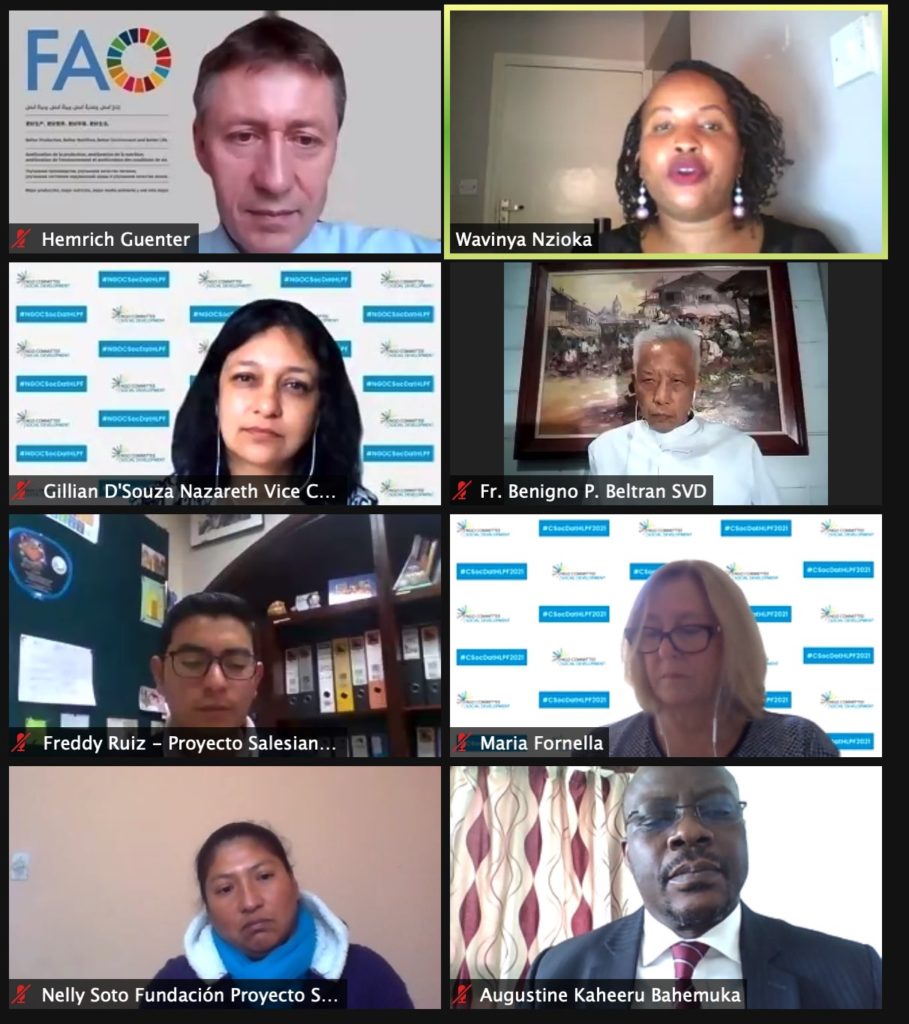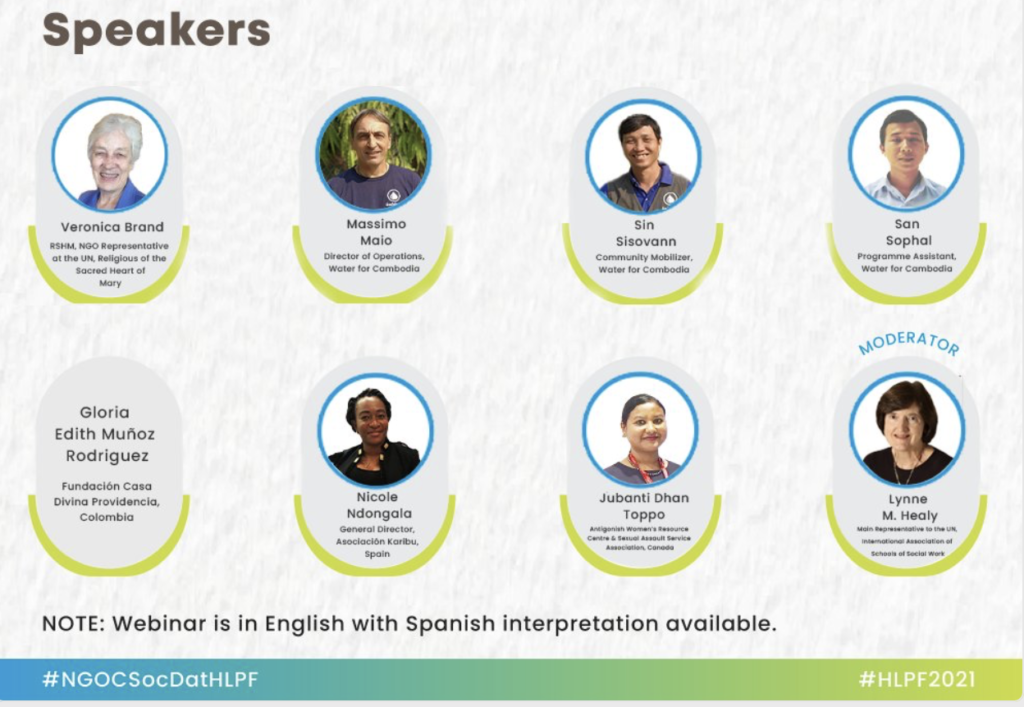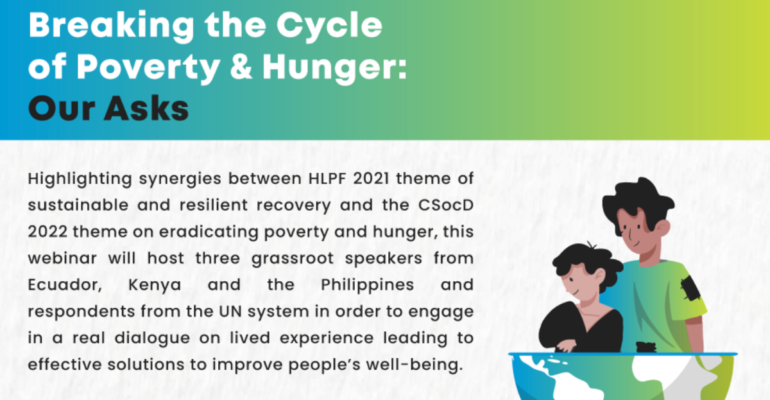Blog by Maria Fornella-Oehninger, SI United Nations Representative in New York and Co-chair of the NGO Committee on Social Development.
The NGO Committee for the Commission on Social Development held two events parallel to High Level Political Forum, ‘Breaking the Cycle of Poverty and Hunger: Our Asks’ and ‘A Steeper Climb towards SDG 10: Grassroots views on Resilient Recovery Post-Covid‘. As Co-chair of the Committee, I was part of the team that organised a “ground-level” political forum to engage those with lived experiences, listen to how they were solving their unmet needs, and connect them to the United Nations experts who devise programs to help them.
Breaking the Cycle of Poverty and Hunger: Our Asks
‘Breaking the Cycle of Poverty and Hunger: Our Asks’ (7 July 2021) brought together three panelists with lived experience, from Ecuador, Kenya, and the Philippines. The respondents were experts from UNDP and FAO. Nelly Soto from Ecuador is an indigenous woman, mother of three, that moved with her husband and children closer to the capital when the family could not make its livelihoods in their own village. Here she joined the Salesian Foundation project, which starts with providing children with a well-equipped place where they can do their homework and play sports. The mothers then formed a Women’s Association, and the project became more ambitious: provide capacity building for women to collaborate in organic farming and raising small animals, so they could feed their families and sell the surplus produce in the market. The Salesian Foundation provided plots for communal farming and trained them to improve harvest by sustainable techniques such as producing fertiliser from earthworms. Weekly educational workshops for families include literacy classes, gender violence and drugs and alcohol prevention. Her asks: access to funds and technical help for technification of irrigation for easier and better harvests, expanding program to include as many families as possible, job creation for indigenous women in Ambato. Support for socio-educational projects, including literacy and civics.

Screenshot of the speakers at the ‘Breaking the Cycle of Poverty and Hunger: Our Asks’ event.
Wavinya Nzioka a woman from Kenya, talked about growing in a polygamous family from illiterate parents, growing up poor, going days without food and not owning a pair of shoes until she was in secondary school. She struggled to get an education but got help from neighbours and teachers. She persisted and got a degree in finance, after which she started a project of kitchen gardens following SDGs guidelines, and found that this short-term project had a long positive impact on the community livelihoods, their education, and their views on gender equality. Her asks: that the UN and the Kenyan government create a policy framework to support food production with sustainable and innovative practices, and to give access to loans to women and youth to embark on innovative projects for the benefit of the community. That would bring some hope and prevent depression and drug abuse.
Father Benigno Beltran from the Philippines, is a missionary priest and a member of VIVAT International, is focused on a holistic, long-term project for No Hunger and No Poverty that would bring the country closer to achieving the SDGs. He plans to plant 1 million bamboo trees by 2030: this would create jobs and absorb 35% more of CO2 more than other trees. His plan includes organic farming cooperatives for women using an E-commerce platform and digital currency. He organises through the parishes, given that the Philippines is 80% Catholic. Finally, he will get high school dropouts to finish school online by providing the means and the skills to do it. He has already a strong partner in Microsoft, and the project also includes teaching coding: making Filipino youth digitally literate to get the jobs of the future. His asks: help finding other partners and investors to his worthy, holistic project.
Guenter Hemrich from FAO offered a global perspective of the importance of all of these projects of rural transformation, gender equality and inclusion, and environmental sustainability presented by the panelist, which in fact represent the main goals of FAO. He stressed the importance of partnerships to achieve the core areas of sustainable development, end poverty and hunger, achieve gender parity and maintain bio-diversity and stop climate change. FAO’s “Hand in Hand” initiative by which FAO works with those countries in most need to accelerate agricultural transformation and sustainable rural development to eradicate poverty, hungry and malnutrition in all its forms. He stressed the importance of understanding that this is an intergenerational process, that we invest today in education for the jobs of the future, which will not be only in agriculture as the digital technology revolution advances into every realm and every corner of the world. Ironically, hunger is often found in agricultural areas and nutrition improves when there are other jobs provided.
Augustine Bahemuka, Ugandan lawyer working for UNDP in Tanzania, explained that FAO and UNDP both have similar objectives and work on public policy frameworks to help those with the greatest needs. UNDP uses a human rights approach to identify capacity building. UNDP focuses on the most vulnerable to bring access to services (health education, social protection) to all, and it becomes a natural implementation partner of NGOs in those most remote areas where there is no government footprint. He stressed the importance of empowering communities by making them aware of their human and legal rights: the UN offers many venues for the redress of rights that local and national courts may want to ignore. He stressed the importance of data collection to be able to measure progress.
A Steeper Climb towards SDG 10: Grassroots views on Resilient Recovery Post-Covid

The Grassroots Task Force of the NGO Committee for Social Development held their event, ‘A Steeper Climb towards SDG 10: Grassroots views on Resilient Recovery Post-Covid’, presenting perspectives on the impact of COVID-19 and the deepening inequalities in communities in South and North America, Asia and Europe. This innovative side event was a follow-up to a pre-COVID-19 global survey on inequalities, with returning panelists offering a unique “before and after” assessment. Massimo Maio, director of operations for Water for Cambodia, explained how their role had been crucial to provide not only infrastructure material such as wells, latrines, and water filters, but also to carry out hygiene training in rural areas of Cambodia during the pandemic, creating protocols for social distancing, hand washing and mask wearing.
Nicole Ndongala (Caribou Association, Spain) is a woman of reference for migrants coming into Spain from Africa and spoke about the difficulties in migrant communities during the pandemic as they lack access to housing, hygiene, health care. Jubanti Dhan Toppo, who joined from the Mikmaki (land of the Mik’maqs), works at the Antigonish Women Reserve Center as part of the Immigrant Support Program and explained how immigrants, refugees, mainly people of colour, had suffered from the direct and indirect effects of the pandemic, due to reduced wages, and little access to food, housing and transportation. Older persons underwent social isolation and lack of services, as well. Her organisation established food banks, community kitchen gardens as well as organising sessions of information to help access to government services.
Gloria Edith Munoz Rodriguez, A Sister of Charity working out of Cali, Colombia, brought in yet another factor that put certain vulnerable communities even in a more dire situation: indeed, armed conflict added to the burdens of Covid-19 for the Afro-Colombian community of Narino on the Pacific Coast of Colombia, a remote rural area, out of the reach of government. The Foundation Casa Divina Providencia helped by providing services since the municipal authorities were unresponsive. She talked about how the new over reliance on digital technology for access to services imposes a new form of exclusion.

Speakers at the ‘A Steeper Climb towards SDG 10: Grassroots views on Resilient Recovery Post-Covid’ event.
In conclusion, after hearing all these voices, we are awed by the courage of people suffering from poverty and hunger, seeking their own solutions, and by the NGOs that, whether by themselves or with the help of UN programmes, implement services while governments appear remote and unconcerned. It reinforces our own commitment, as members of the NGO Committee on Social Development, to continue vigorous advocacy work to make governments more responsive to the needs of all those left behind.
To see the video highlights of the NGO CSocD parallel events at the HLPF 2021, visit HERE.
This blog was edited post-publication to clarify that Jubanti Dhan Toppo’s talk was given from Mikmaki (land of the Mik’maqs), the traditional, ancestral, and unceded territory of the Mikmaq people.

